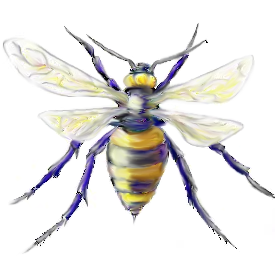Mauve nectarbee
From Wikimalia
(Difference between revisions)
| (10 intermediate revisions not shown.) | |||
| Line 1: | Line 1: | ||
{{Collection-Bugs | {{Collection-Bugs | ||
| - | |image= | + | |image=Mauve_Nectarbee.png |
| - | |name=Mauve | + | |name=Mauve nectarbee |
| - | |habitat= | + | |habitat=Temperate deciduous regions. |
| - | |description= | + | |description=Horizontally striped in amber and deep violet bands, this hymenoptera sports an unlikely dual-wing set which produces a characteristic low-pitched reedy buzz during flight. Six spindly legs depend from an oversized body, all of which are coated with tiny filament hairs for the collection of pollen. Approximately one [[Measurements|thum]] in length for adults, its wingspan is oddly shorter than its length, defying logic as to how this insect flies at all. |
| - | + | |notes=Preferring only Dryadslipper Flowers, its honey is stained mauve, and ferments quickly, producing a highly desired fruity liquor. Often, the nectarbee is seen while coated in pollens, giving a distorted impression of its true appearance. It has but a single specialized natural enemy, the [[dryadslipper spider]], although any number of nectar-seeking scavengers might find themselves on the short end of this insect's colonial temper. | |
| - | |notes=Preferring only Dryadslipper Flowers, its honey is stained mauve, and ferments quickly, producing a highly desired fruity liquor. | + | Hives are typically a honeycombed inverted cone, best suited for the highest crotch of a tree to support its weight, although domesticated varieties are often hived in conical baskets. |
}} | }} | ||
| + | "Woe to he whom with nectar upon lips would beguile a queen." | ||
| + | ---folk wisdom. | ||
{{stub}} | {{stub}} | ||
Back to the [[Insect/Arachnid]] page. | Back to the [[Insect/Arachnid]] page. | ||
Current revision
| The Bug Collection | ||||||||
|---|---|---|---|---|---|---|---|---|
|
| ||||||||
| ||||||||
"Woe to he whom with nectar upon lips would beguile a queen." ---folk wisdom.
This article is a stub. You can help Wikimalia by expanding it.
Back to the Insect/Arachnid page.

